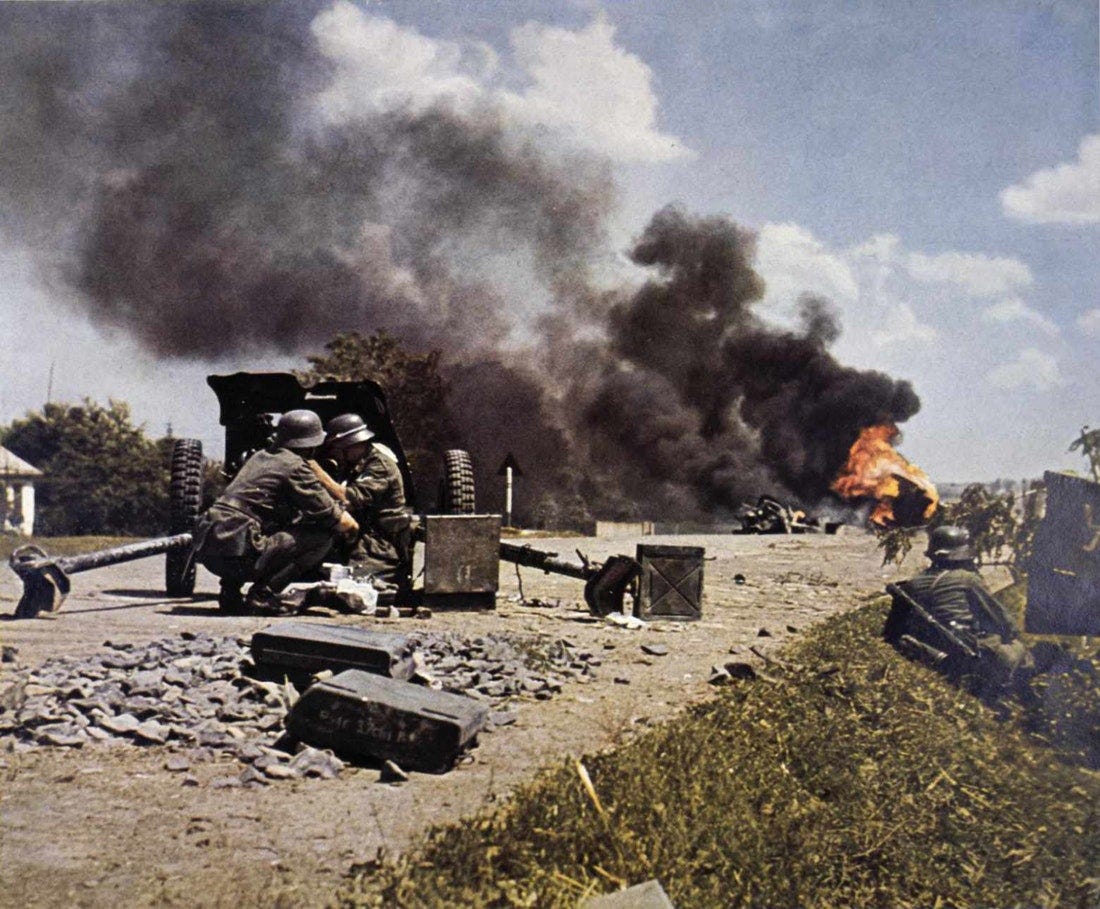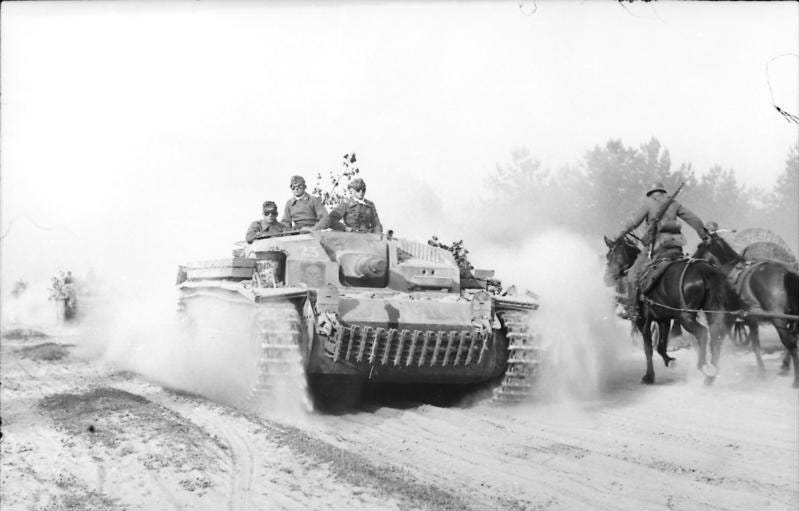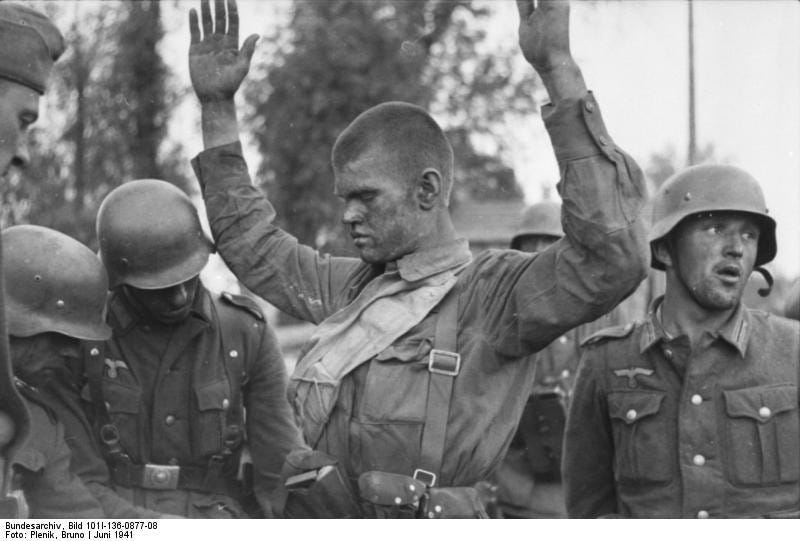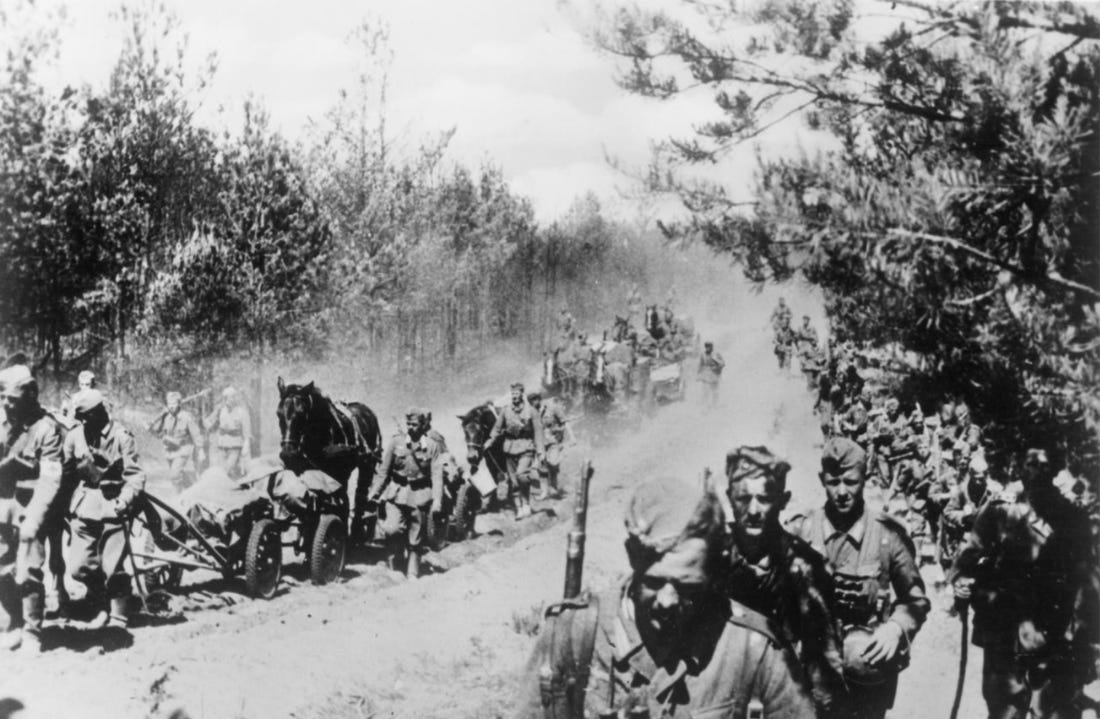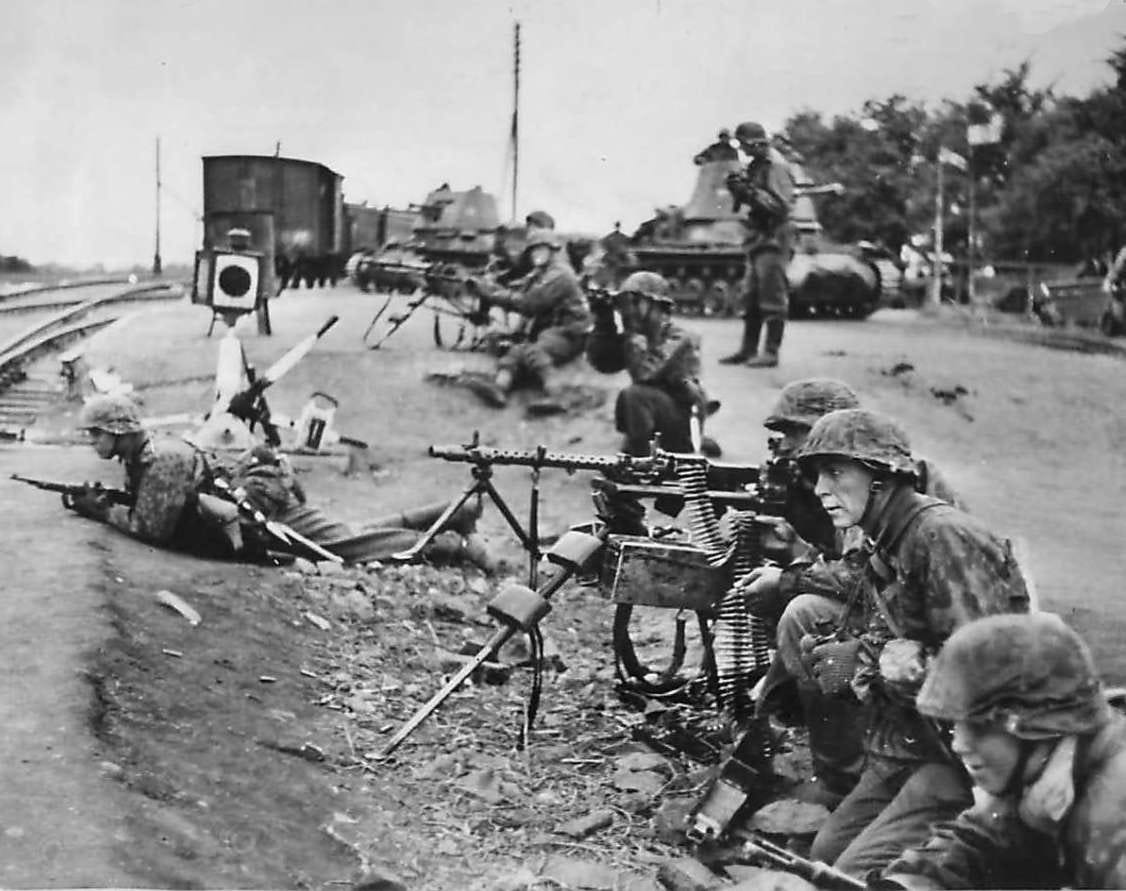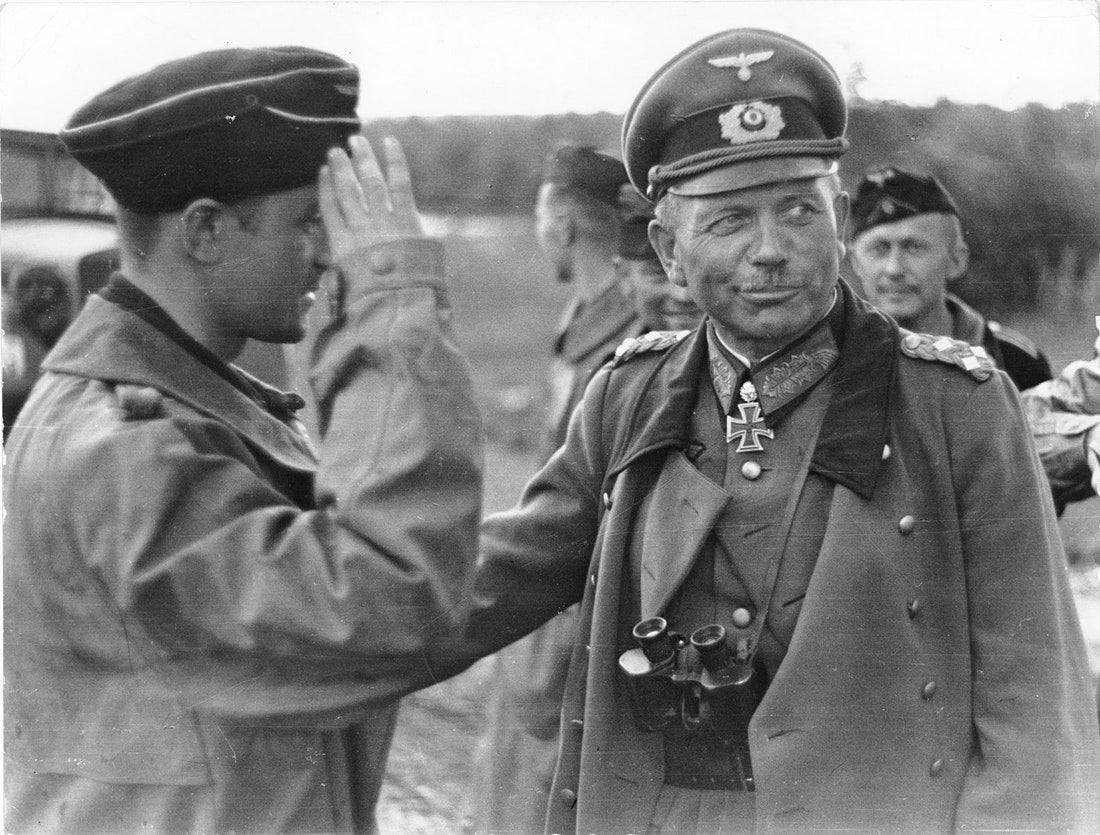Barbarossa - the assault on Russia
A look back at the largest invasion in human history, a selection of the daily posts from World War II Today
22 June 1941: Hitler invades Russia with the largest army ever assembled
At exactly 3.15 a.m., in the faint first light of day I was on my way to water the horses at the river when the whole area exploded. All hell was let loose and I prayed for the strength to hold my two horses.
The noise and sight were indescribable, the earth seemed to tremble, all the batteries came alive out of the darkness of the pine trees. Flames shot towards the border followed by the explosion of the shells on the other side. All around us were what appeared to be great sheets of lightning, torn through by flames while thunder crashed and boomed.
The barrage kept on and on, no one could hear anything else and orders had to be given by hand signal. We were ordered to march towards the river, where special units had already erected a pontoon bridge, over which, although we could not hear them, we could see our tanks rumbling.
25th June 1941: A Luftwaffe Pilot describes dive bombing on the Eastern front
At first the spot that we had been ordered to dive-bomb presented a totally chaotic and confusing picture. So we circled the area a few times desperately trying to sort out friend from foe. This spurred the enemy gunners to even greater efforts. They were letting fly with everything they had by now. But their aim did not match their enthusiasm. We suffered no damage and their wild firing merely served to betray their positions to us.
Once we had got the situation on the ground firmly established in our minds, we opened out and started to climb in preparation for the attack. After a brief exchange over the R/T with our Schwarmfuhrer, we positioned ourselves ready to dive on what we had identified as the leading group of enemy tanks.
We followed each other down in rapid succession. I hardly had time to register the explosions from the leading pair before releasing my own bombs. If the mushrooms of black smoke and flames were anything to go by, our aim must have been spot on.
13th July 1941: The condition of Russian roads slows the Wehrmacht advance
The infantry had a hard time keeping up. Marches of twenty-five miles in the course of a day were by no means exceptional, and that over the most atrocious roads.
A vivid picture which remains of these weeks is the great clouds of yellow dust kicked up by the Russian columns attempting to retreat and by our infantry hastening in pursuit.
The heat was tremendous, though interspersed with sudden showers which quickly turned the roads to mud before the sun reappeared and as quickly baked them into crumbling clay once again.
28 July 1941: Should Hitler press on to Moscow immediately?
It was now becoming apparent that by diverting some troops away from Army Group Centre they could could link up with the other groups and create vast encirclements around the Russian Army. There were also huge economic prizes to be won in the south.
But this meant deviating from the original plan and delaying the assault on Moscow. Major Gerhard Engel, Hitler's Army Adjutant, was privy to Hitler's thoughts at the time the critical decision was made…
9th August 1941: Not every member of the Wehrmacht wanted war
Max Kuhnert was a mounted trooper, part of a forward reconnaissance section for his unit. They were soon to be diverted south to assist Army Group South seize the rich farmlands of the Ukraine.
It was this area - the bread basket of Russia - that Hitler envisaged as the frontier land of the new German empire. In this New Order the 'slavs' would be largely wiped out, just like the American Indians had been been, and German settlers would farm the land to supply food to Germany and western Europe. He even referred to the river Volga as the 'German Mississippi'. Food sent to Germany would be food denied to the rest of Russia - which, after waves of famine and starvation, would revert to sparsely populated forests.
This vision was not shared with the all the front line troops…
30st August 1941: For those captured in the summer of 1941 the chances of survival were slim
We suddenly saw a broad, earth-brown crocodile slowly shuffling down the road towards us. From it came a subdued hum, like that from a beehive.
Prisoners of war. Russians, six deep. We couldn't see the end of the column. As they drew near the terrible stench which met us made us quite sick; it was like the biting stench of the lion house and the filthy odour of the monkey house at the same time.
But these were not animals, they were men. We made haste out of the way of the foul cloud which surrounded them, then what we saw transfixed us where we stood, and we forgot our nausea.
26th September 1941: German infantryman describes living conditions in Russia
Slowly but irresistibly we moved across the steppe toward the great adventure.
Sun seared. Dust and sweat begrimed our faces, and the march and the road seemed never-ending.Low white-washed cottages stood among fruit trees and wells, all of it lost in infinitude. Women in brightly colored headscarfs stood barefoot on the broad road, beautiful figures among them. We saw hardly any men. We marched.
Our feet swelled up and hurt; our breaths came quicker and shallower till we were allowed to rest. Every night was a relief. I felt an utter stranger in Russia.
2nd October 1941: The drive on Moscow resumes with a huge Wehrmacht assault
No sooner were we clear of the trench than I felt better. I doubled up and ran through the lane in the minefield. Schepanski followed. A salvo of shells howled in my ears and instinctively I flung myself against the wet earth and pressed myself hard into a small hollow. Deafeningly, the shells exploded 50 yards to our right, showering us with soil and shattered sods of grass.
Up and forward again — keep going forward before the next burst catches up. I heard Schepanski gasping behind me. With less caution we ran across the uneven grass into a long hollow.
9th October 1941: High risk Waffen-SS attack pays off in city of Mariupol
Explosive rounds from Bugelsack's armored car ripped the vehicles apart. The machine-gun fire from the Kradschutzen echoed gruesomely over the square. Burning soldiers leapt from the ladder truck and ran across the broad plaza like torches. A fuel drum had been hit and the explosion had set dozens of men on fire.
A panic-stricken mass of humanity stormed into the side streets, trampling anything in its way underfoot.
4th November 1941: Like many Germans, Karl Fuchs believes that the war against Russia is very nearly over
Our last battle of encirclement against the enemy up here and your experiences in Kiev will never be forgotten. We have never before struck the enemy with such crushing defeats. I guess the Russians never dreamed that we would engage in this kind of an offensive prior to winter…
27th November 1941: German soldiers face a new deadly enemy - the Russian winter - and they are ill prepared
The snow blew almost horizontally in blizzards that sometimes lasted all day long, with the wind piercing our faces with a thousand needles. The cold numbed and deadened the human body from the feet up until the whole body was an aching mass of misery. To keep warm, we had to wear every piece of clothing we owned to achieve a layered effect. Each man fought the cold alone, pitting his determination and will against the bitter winter.
20 December 1941: General Guderian tries to tell Hitler about conditions on the Eastern Front after the Fuhrer takes over as Commander In Chief of the Army
Hitler: ‘I know that you have not spared yourself and that you have spent a great deal of time with the troops. I grant you that. But you are seeing events at too close a range. You have been too deeply impressed by the suffering of the soldiers. You feel too much pity for them. You should stand back more. Believe me, things appear clearer when examined at longer range.’


